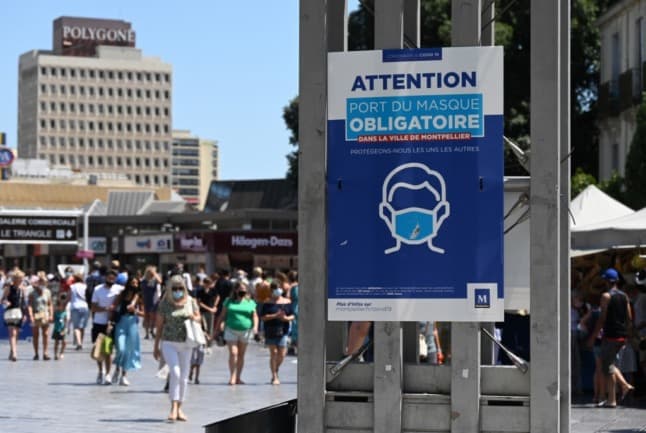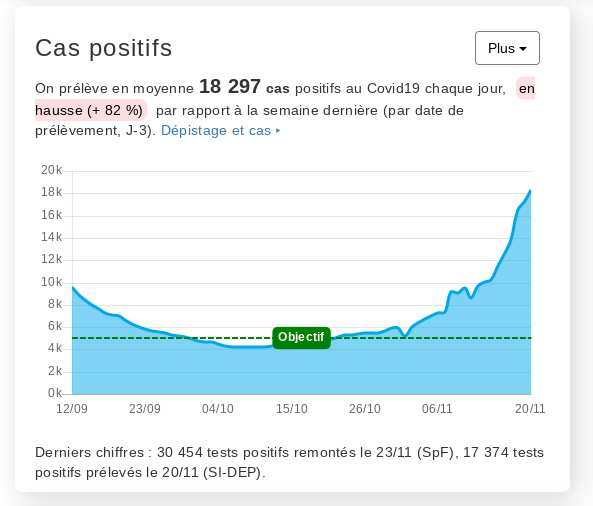What is driving the explosion of Covid cases in France?

After many months of falling or stable Covid rates, cases are now rising rapidly in France - so what is driving the increase and how worried is the government?
France recorded nearly 30,000 new Covid cases on Tuesday, while the weekly average shows a 82 percent increase on the previous week.
For the moment, the average daily case rates of 18,000 remain lower than many of France's neighbours (and less than half of those recorded in the UK), but the very rapid increase in cases over the past two weeks has alarmed experts.

Graph showing the evolution of positive Covid tests, with a daily average of 18,297 new cases. Graph: Covidtracker.fr
Overview
France is recording a daily average rate of 18,297 new cases - the daily average is considered the most accurate measure as it avoids problems with under-reporting over the weekends and consequently high numbers at the start of the week as data is adjusted.
Thanks to France's high vaccine rate, fewer patients are becoming seriously ill. There are now 1,455 Covid patients in intensive care, representing 29 percent of ICU capacity.
France is reporting an average of 54 Covid deaths per day. Both death and hospitalisation rates, while remaining relatively low, are also showing significant increases - deaths are up 54 percent on the previous week while intensive care admissions are up 35 percent.
What is driving the new wave?
Children - the biggest single increase is in the 6-10 age group, which has seen a 148 percent increase in the incidence rate in a week. There are now 340 cases per 100,000 children aged between 6 and 10, compared to the overall incidence rate of 191.
Children in this age group do not yet qualify for a vaccine - a decision that the government will be reviewing - and although it is rare for them to get seriously ill with Covid they can transmit the virus to more vulnerable people, such as grandparents. There is also the concern of 'long Covid'.
Primary schools in areas with low Covid cases relaxed mask rules in the autumn, but these rules are now back in place and all primary school children wear masks in class.
Le taux d'incidence chez les enfants âgés de 6 à 10 ans grimpe à 340 (courbe verte), en hausse de 148% en une semaine.
Il était de 80 il y a deux semaines, lors de la rentrée des vacances de la Toussaint. #Covid19
1/4 ⤵️ pic.twitter.com/lxJ1WsxHjR
— Nicolas Berrod (@nicolasberrod) November 23, 2021
Weather - Over the summer socialising could take place outdoors and the majority of French people ate and drank with friends en terrasse. However the cold weather is now driving people indoors and cafés are closing their expanded terraces. At present masks are not required in indoor spaces which are covered by the health pass - such as cinemas, tourist sites, and cafés - but this rule could be revised.
Neighbours - France sits between three countries - the UK, Belgium and Germany - which have seen big surges in case numbers. Travel between France and Belgium and Germany is largely unrestricted with only unvaccinated travellers requiring a Covid test. Travel between France and the UK is still restricted for unvaccinated travellers, who require an essential reason to come to France. For full details on all travel heads, head to our Travelling to France section.
Vaccine fade - France got off to a slow start with its vaccination programme, which means that the six month 'vaccine fade effect' documented in other countries is only now becoming apparent in France as people reach the six-month anniversary of their second dose.
Vaccine booster shots are open to over 65s and priority groups, and will be expanded to over 50s on December 1st. For over 65s, the booster shot will be required in order to keep their health pass. The government is reviewing a possible expansion of the booster shot programme.
READ ALSO Who is eligible for a Covid booster in France?
Relaxation of barrier gestures - as cases fell the government relaxed several rules such as the mask mandate, but advice on barrier gestures - hand-washing, physical distance, avoiding kisses and handshakes - remain in place. However many people have observed that 'barrier gestures' are less well observed than before, with around half of French people saying they have resumed doing la bise - the double (or treble, or quadruple) cheek kiss.
How worried are the government?
The government's Defence Council is meeting on Wednesday to discuss the situation and whether any new measures are required.
A return to lockdown has been ruled out at this stage, but the government is looking at other measures including an acceleration of the vaccine booster programme and tightening up mask rules for indoor areas.
READ ALSO What can we expect from the government as France battles fifth wave of Covid?
When will it end?
Obviously this depends in part on what action the government takes, but Martin Hirsch, director general of the Paris hospitals group AP-HP, expects the peak in hospital numbers to occur "at the end of December or the beginning of January".
Comments (1)
See Also
France recorded nearly 30,000 new Covid cases on Tuesday, while the weekly average shows a 82 percent increase on the previous week.
For the moment, the average daily case rates of 18,000 remain lower than many of France's neighbours (and less than half of those recorded in the UK), but the very rapid increase in cases over the past two weeks has alarmed experts.

Graph showing the evolution of positive Covid tests, with a daily average of 18,297 new cases. Graph: Covidtracker.fr
Overview
France is recording a daily average rate of 18,297 new cases - the daily average is considered the most accurate measure as it avoids problems with under-reporting over the weekends and consequently high numbers at the start of the week as data is adjusted.
Thanks to France's high vaccine rate, fewer patients are becoming seriously ill. There are now 1,455 Covid patients in intensive care, representing 29 percent of ICU capacity.
France is reporting an average of 54 Covid deaths per day. Both death and hospitalisation rates, while remaining relatively low, are also showing significant increases - deaths are up 54 percent on the previous week while intensive care admissions are up 35 percent.
What is driving the new wave?
Children - the biggest single increase is in the 6-10 age group, which has seen a 148 percent increase in the incidence rate in a week. There are now 340 cases per 100,000 children aged between 6 and 10, compared to the overall incidence rate of 191.
Children in this age group do not yet qualify for a vaccine - a decision that the government will be reviewing - and although it is rare for them to get seriously ill with Covid they can transmit the virus to more vulnerable people, such as grandparents. There is also the concern of 'long Covid'.
Primary schools in areas with low Covid cases relaxed mask rules in the autumn, but these rules are now back in place and all primary school children wear masks in class.
Le taux d'incidence chez les enfants âgés de 6 à 10 ans grimpe à 340 (courbe verte), en hausse de 148% en une semaine.
— Nicolas Berrod (@nicolasberrod) November 23, 2021
Il était de 80 il y a deux semaines, lors de la rentrée des vacances de la Toussaint. #Covid19
1/4 ⤵️ pic.twitter.com/lxJ1WsxHjR
Weather - Over the summer socialising could take place outdoors and the majority of French people ate and drank with friends en terrasse. However the cold weather is now driving people indoors and cafés are closing their expanded terraces. At present masks are not required in indoor spaces which are covered by the health pass - such as cinemas, tourist sites, and cafés - but this rule could be revised.
Neighbours - France sits between three countries - the UK, Belgium and Germany - which have seen big surges in case numbers. Travel between France and Belgium and Germany is largely unrestricted with only unvaccinated travellers requiring a Covid test. Travel between France and the UK is still restricted for unvaccinated travellers, who require an essential reason to come to France. For full details on all travel heads, head to our Travelling to France section.
Vaccine fade - France got off to a slow start with its vaccination programme, which means that the six month 'vaccine fade effect' documented in other countries is only now becoming apparent in France as people reach the six-month anniversary of their second dose.
Vaccine booster shots are open to over 65s and priority groups, and will be expanded to over 50s on December 1st. For over 65s, the booster shot will be required in order to keep their health pass. The government is reviewing a possible expansion of the booster shot programme.
READ ALSO Who is eligible for a Covid booster in France?
Relaxation of barrier gestures - as cases fell the government relaxed several rules such as the mask mandate, but advice on barrier gestures - hand-washing, physical distance, avoiding kisses and handshakes - remain in place. However many people have observed that 'barrier gestures' are less well observed than before, with around half of French people saying they have resumed doing la bise - the double (or treble, or quadruple) cheek kiss.
How worried are the government?
The government's Defence Council is meeting on Wednesday to discuss the situation and whether any new measures are required.
A return to lockdown has been ruled out at this stage, but the government is looking at other measures including an acceleration of the vaccine booster programme and tightening up mask rules for indoor areas.
READ ALSO What can we expect from the government as France battles fifth wave of Covid?
When will it end?
Obviously this depends in part on what action the government takes, but Martin Hirsch, director general of the Paris hospitals group AP-HP, expects the peak in hospital numbers to occur "at the end of December or the beginning of January".
Join the conversation in our comments section below. Share your own views and experience and if you have a question or suggestion for our journalists then email us at [email protected].
Please keep comments civil, constructive and on topic – and make sure to read our terms of use before getting involved.
Please log in here to leave a comment.